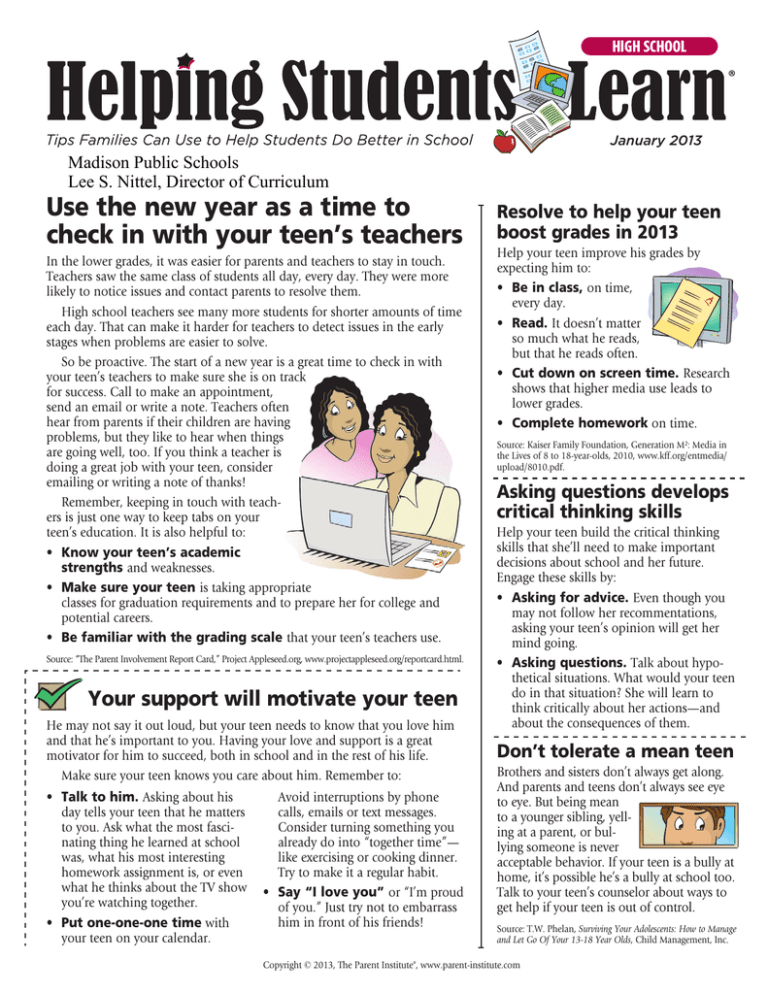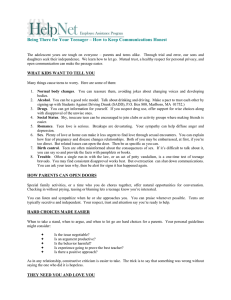Use the new year as a time to
advertisement

January 2013 Madison Public Schools Lee S. Nittel, Director of Curriculum Use the new year as a time to check in with your teen’s teachers In the lower grades, it was easier for parents and teachers to stay in touch. Teachers saw the same class of students all day, every day. They were more likely to notice issues and contact parents to resolve them. High school teachers see many more students for shorter amounts of time each day. That can make it harder for teachers to detect issues in the early stages when problems are easier to solve. So be proactive. The start of a new year is a great time to check in with your teen’s teachers to make sure she is on track for success. Call to make an appointment, send an email or write a note. Teachers often hear from parents if their children are having problems, but they like to hear when things are going well, too. If you think a teacher is doing a great job with your teen, consider emailing or writing a note of thanks! Remember, keeping in touch with teachers is just one way to keep tabs on your teen’s education. It is also helpful to: • Know your teen’s academic strengths and weaknesses. • Make sure your teen is taking appropriate classes for graduation requirements and to prepare her for college and potential careers. • Be familiar with the grading scale that your teen’s teachers use. Source: “The Parent Involvement Report Card,” Project Appleseed.org, www.projectappleseed.org/reportcard.html. Your support will motivate your teen He may not say it out loud, but your teen needs to know that you love him and that he’s important to you. Having your love and support is a great motivator for him to succeed, both in school and in the rest of his life. Make sure your teen knows you care about him. Remember to: • Talk to him. Asking about his day tells your teen that he matters to you. Ask what the most fascinating thing he learned at school was, what his most interesting homework assignment is, or even what he thinks about the TV show you’re watching together. • Put one-one-one time with your teen on your calendar. Avoid interruptions by phone calls, emails or text messages. Consider turning something you already do into “together time”— like exercising or cooking dinner. Try to make it a regular habit. • Say “I love you” or “I’m proud of you.” Just try not to embarrass him in front of his friends! Resolve to help your teen boost grades in 2013 Help your teen improve his grades by expecting him to: • Be in class, on time, every day. • Read. It doesn’t matter so much what he reads, but that he reads often. • Cut down on screen time. Research shows that higher media use leads to lower grades. • Complete homework on time. Source: Kaiser Family Foundation, Generation M²: Media in the Lives of 8 to 18-year-olds, 2010, www.kff.org/entmedia/ upload/8010.pdf. Asking questions develops critical thinking skills Help your teen build the critical thinking skills that she’ll need to make important decisions about school and her future. Engage these skills by: • Asking for advice. Even though you may not follow her recommentations, asking your teen’s opinion will get her mind going. • Asking questions. Talk about hypothetical situations. What would your teen do in that situation? She will learn to think critically about her actions—and about the consequences of them. Don’t tolerate a mean teen Brothers and sisters don’t always get along. And parents and teens don’t always see eye to eye. But being mean to a younger sibling, yelling at a parent, or bullying someone is never acceptable behavior. If your teen is a bully at home, it’s possible he’s a bully at school too. Talk to your teen’s counselor about ways to get help if your teen is out of control. Source: T.W. Phelan, Surviving Your Adolescents: How to Manage and Let Go Of Your 13-18 Year Olds, Child Management, Inc. Copyright © 2013, The Parent Institute®, www.parent-institute.com Make sure your teen isn’t overscheduled January 2013 How can I make sure my teen stays focused on school? Q: My son is sixteen. He and his friends now have driver’s licenses. Mostly, that means we don’t see him. Ever. Even on school nights, he heads out to “study” with friends. I’m worried. What can I do to make sure he’s spending enough time on schoolwork and with our family, too? A: Spending time with friends is important to teens. It is one of the ways they learn about themselves as they move into adulthood. But if your son is spending every night out of your house, it’s time to draw some lines. Ask questions: Where is he going? Who else is there? Will there be adult supervision? You need answers to all those questions before he heads out. Set limits on his time away from home. For example, have an early curfew on school nights. If your teen says he needs to work on a project with other students, invite them to your place. The point is not that you want to keep him away from his friends, but that you want to make sure he spends time on his schoolwork instead of just socializing. It’s also important to stay connected with your teen. Schedule together time. Play cards or a board game. Prepare a meal. Pop some popcorn and watch a favorite movie. Is your teen a smart social networker? Facebook and other social networking sites are increasingly popular among teens. If your teen wants to be part of a social network, there are some ways you can help her be safe—and keep her focused on her schoolwork. Are you doing what you can? Answer yes or no to each question: long your teen can be on ___1. Have you talked with your social networking sites? teen about the dangers of cyberbullying, as well as ___5. Do you have clear rules sharing too much personal about references to alcohol or information on the Internet? drug use on your teen’s social networking pages? Review the ___2. Does your teen know school’s policy about social that if she wants to be on a networking together. social networking site, you must be part of her network? How did you score? Each yes ___3. Have you talked about not means you are helping your teen use posting inappropriate pictures social networking safely. online? There is no such thing you kes a t as “erasing” something from t ari 4-ye ime t 1 the Internet once it is posted. e a d th t }In derstan 5.~ raul ___4. Have you set limits for 1 n ert B s u b o n R to — ur when, where, and for how he t old, Teens today are constantly on the go. But is your teen taking on too much? To make sure he’s well-balanced: • Look for signs of stress. Is he irritable or more tired than usual? Does he have trouble concentrating? • Review his habits. Does he stay up late to finish homework? Does he often forget where he’s supposed to be? • Discuss his schedule. Does he have too much going on between his homework and after-school commitments? Does he have “free time” during the week to relax? If your teen needs to slow down, help him set priorities. His school work and his health come first! Source: “12 Warning Signs That Your Child May Be Overscheduled,” Scholastic Families, www.scholastic.com/ schoolage/grade4/development/qc_overscheduled.htm. Encourage your teen to give back to the community Some classes include community service hours as a component of students’ grades. But even if your teen isn’t required to help in the community for a grade, encourage her to! When teens volunteer and help their community, they: • Develop new skills. • Feel like they’re making a difference. • Learn to work with others. Listening can develop a mutual understanding Do you really listen to your teen, or are you just waiting for a chance to reply? Here’s an exercise. After your teen speaks, repeat in your own words what he just said to you. Ask your teen if you got it right. Have your teen try this, too. Copyright © 2013, The Parent Institute®, www.parent-institute.com Helping Students Learn® Published in English and Spanish, September through May. Publisher: John H. Wherry, Ed.D. Editor: Stacey Marin. Staff Editors: Rebecca Miyares & Erika Beasley. Writer: Pat Hodgdon. Production Manager: Pat Carter. Translations Editor: Victoria Gaviola. Layout & Illustrations: Maher & Mignella, Cherry Hill, NJ. Copyright © 2013, The Parent Institute®, a division of NIS, Inc. P.O. Box 7474, Fairfax Station, VA 22039-7474 1-800-756-5525 • www.parent-institute.com • ISSN 1526-9280 1527-103x X02688343

